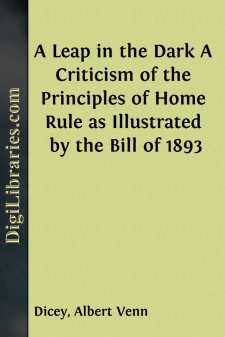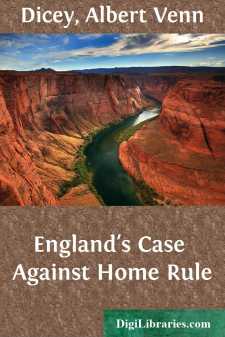Categories
- Antiques & Collectibles 13
- Architecture 36
- Art 48
- Bibles 22
- Biography & Autobiography 813
- Body, Mind & Spirit 142
- Business & Economics 28
- Children's Books 14
- Children's Fiction 11
- Computers 4
- Cooking 94
- Crafts & Hobbies 4
- Drama 346
- Education 46
- Family & Relationships 57
- Fiction 11829
- Games 19
- Gardening 17
- Health & Fitness 34
- History 1377
- House & Home 1
- Humor 147
- Juvenile Fiction 1873
- Juvenile Nonfiction 202
- Language Arts & Disciplines 88
- Law 16
- Literary Collections 686
- Literary Criticism 179
- Mathematics 13
- Medical 41
- Music 40
- Nature 179
- Non-Classifiable 1768
- Performing Arts 7
- Periodicals 1453
- Philosophy 64
- Photography 2
- Poetry 896
- Political Science 203
- Psychology 42
- Reference 154
- Religion 513
- Science 126
- Self-Help 84
- Social Science 81
- Sports & Recreation 34
- Study Aids 3
- Technology & Engineering 59
- Transportation 23
- Travel 463
- True Crime 29
Albert Venn Dicey
Albert Venn Dicey (1835–1922) was a British jurist and constitutional theorist known for his influential works on constitutional law. He is most famous for his book "Introduction to the Study of the Law of the Constitution" (1885), where he outlined key principles like parliamentary sovereignty and the rule of law. Dicey argued that the British Parliament holds supreme authority and that no person or body can override its laws. His writings continue to shape discussions on constitutional theory, particularly in the United Kingdom.
Author's Books:
Sort by:
Introduction Irish Unionists have pressed for a republication of A Leap in the Dark. They hold that it will be of some service in their resistance to the Coalition of Home Rulers, Socialists, and Separatists formed to force upon the people of England and of Scotland a virtual dissolution of the Union between Great Britain and Ireland. It would in any case have been a pleasure to afford aid, however...
more...
CHAPTER I. NATURE OF THE ARGUMENT.Aim and line of argumentMy aim is to criticise from a purely English point of view the policy of Home Rule, or the proposal to create a more or less independent Parliament in Ireland; and as a result of such criticism to establish the truth, and develop the consequences, of this proposition—namely, that any system of Home Rule, whatever be the form it takes, is less...
more...



